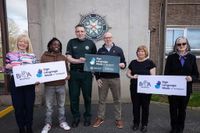The Police Service recently introduced a groundbreaking video relay service aimed at enhancing accessibility for the deaf community. This new initiative means that users of Irish Sign Language (ISL) and British Sign Language (BSL) can communicate directly with police officers from the comfort of their homes. The launch took place on March 20, 2025, during British Sign Language Awareness Week (March 17-23), a time dedicated to celebrating and promoting the use of sign language.
With the new service, deaf individuals can connect to trained interpreters via the Police Service website or the SignVideo app, facilitating clearer communication with the police’s Contact Management Centre. Chief Inspector Michelle Adams emphasized the service's importance, stating, "This service means that people from the deaf community will now be empowered to report anything to us themselves, allowing us to take the most meaningful information we can from them and start investigating or supporting in the most appropriate way." The initiative aims to ensure that every member of the community can access police services.
In addition to empowering the deaf community, Majella McAteer, the British Deaf Association (BDA) NI Manager, expressed her excitement about the launch, highlighting it as a significant step towards equality for sign language users. "We are especially delighted that this launch coincides with our annual Sign Language Week... This is a significant development and a true step forward in achieving equality for sign language users," she said. The use of qualified interpreters with years of training assures confidentiality and professionalism, fostering a trustworthy environment for users.
Meanwhile, personal journeys of those in the policing sector illustrate the social impact of sign language. PC Danielle Fleming, a member of the North Wales Police, shared her experience of learning sign language after a poignant incident that occurred when she was a teenager. On a bus, she witnessed an elderly couple in distress, unable to assist them due to her lack of sign language knowledge. "I could see they were signing, but I didn’t really understand it at the time," she recalled. This moment fueled her motivation to educate herself in BSL, leading to her eventual qualification.
Now, as a police officer, Fleming utilizes her skills to communicate with the deaf community, enhancing their interactions with law enforcement. "Within my first week as an officer, I was assisting with the search for a wanted man, who was hiding in a flat owned by a profoundly deaf man. I told them I could sign, so I went to speak to him to explain why we were there. From that day onwards, I never had any issues with that man again," Fleming explained. Her personal investment in learning sign language has enriched her professional life, demonstrating the far-reaching effects of effective communication.
Furthermore, sign language plays a vital role in Fleming's family life, especially with her son, who was diagnosed with autism at just two and a half years old. "Not being able to verbally communicate with him was difficult," she noted. "I started signing with him, and while we were playing, I would ask him if he was happy or sad. That day, his behaviour and his reaction was different to what it had ever been before." Keeping the lines of communication open with her son, who is now eight, has proven beneficial; they continue to sign together in their unique way.
Danielle Fleming is also committed to fostering inclusivity within her police environment. She has joined the North Wales Police choir and actively practices signing songs to include individuals with sensory loss in their performances. "I can’t sing, I sound like a cat, but I really loved the idea behind it," she said, underscoring her dedication to using her sign language skills to ensure that everyone feels included.
As the deaf community continues to receive more accessible services, both the launch of the video relay service and the personal stories of officers like PC Fleming signify a turning point in communication and societal inclusivity. With programs like these in place, the relationship between law enforcement and the deaf population is set to grow stronger, grounded in mutual understanding and respect.
In closing, both Chief Inspector Michelle Adams and Majella McAteer emphasized the need for ongoing advocacy and support, highlighting that the success of these initiatives depends on community awareness and participation. "We are here for you too. Please don’t be afraid to come and talk to us and we cater for anybody’s needs," Fleming urged, inviting feedback and education to enhance her skills further. This collective effort is a crucial step towards a future where everyone, regardless of their communication needs, can find their voice in society.


